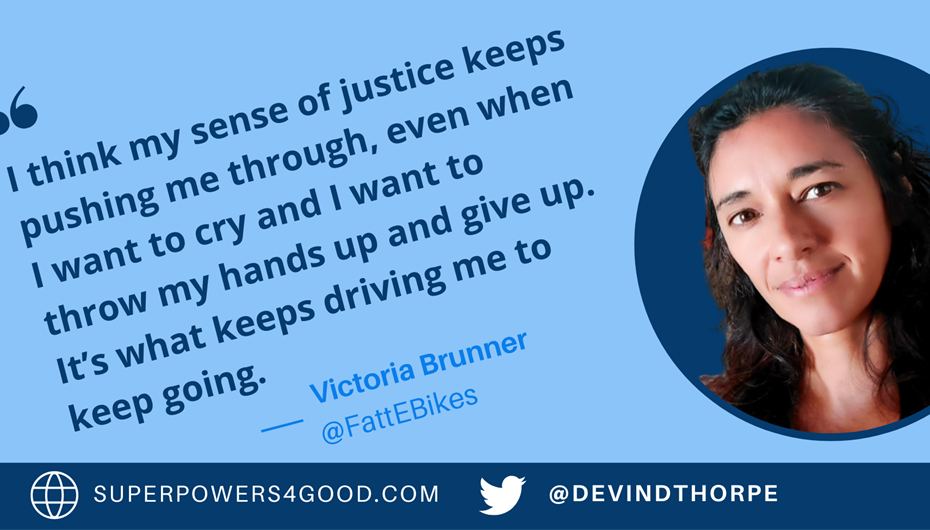Devin: What do you see as your superpower?
Victoria: I would say my superpower is my—this is very superman of me—my sense of justice. Since I was 15 or 16, I told myself I was going to be in Greenpeace and I was going to be an eco-warrior. So I think since a young age, I’ve known that whatever I did with my life, it had to have a sense of purpose and that it was going to make change in the world.
“My husband and I had gone down to a one-car household, and we were looking for a different form of transportation other than having to purchase a second car,” says Victoria Brunner, CEO of FattE-Bikes. “So we looked at all the options, including public transportation, Lyft, you name it. I stumbled across electric bikes, and I said, ‘Hey, have you seen these?’”
That 2017 conversation led to success and impact they scarcely could have imagined at that moment.
“I realized quickly that what a lot of the bikes are coming from overseas in Asia, and the quality control was just not there,” She says. “So, from the get-go, we knew that we wanted to build a higher quality electric bike but still have it be sold at an accessible price. That’s why we made the decision to start building them here, which is not easy to do, but it’s probably smarter and better to do it that way.”
The couple began production at a small scale right in their garage. “We were driving around an old clunky van to people’s houses so they could demo the bike,” Victoria says. “Then we kind of transitioned to a small space in a solar company’s building, and we had set up a mechanic stand with weights so it wouldn’t tip over when you put the heavy electric bike on it.”
“Since then, we’ve kind of graduated to a much bigger facility with full stands,” she says with a smile. “We have the power lifts, electric power lifts—up and down. Nothing’s tipping over anymore; I’m happy to say. I’m pretty sure OSHA will be happy about that, too.”
Today, the company has ten employees and has sold 3,000 e-bikes, reaching $4 million in revenue.
Victoria sees strength in what others might have said was a weakness. She was not a cyclist. “As a consumer, as a commuter, as a woman, I’m looking for comfort when I’m getting to work or running errands or taking my kids to school,” she says. “I’m going to look at things very differently than, say, somebody who’s been cycling their whole life.”
Putting it succinctly, she says, “I’m looking for a vehicle that’s going to replace my car.
“FattE-Bikes, that stands for fat tire electric bike,” Victoria explains. “The fat tires are actually what allows year-round riding. We didn’t want to design a bike that replaces your car, but then that you have to hang up 4 or 5 months of the year.”
Victoria’s desire for impact goes beyond the environment, she says:
A couple of the fleet sales that we've done I'm most proud of are two low-income residents. The kind of e-bike libraries, whether they're being sent to a community that's like a tiny home community in Denver or now we just recently sold and are sending 30 bikes out to the city of LA for their pilot program, their low-income pilot program in Compton and Watts area that they'll be providing low-income residents with electric bikes to use.
She is also looking to employ improving technology to extract data from bicycles to track health statistics and carbon emission reductions.
FattE-Bikes raised over $250,000 via investment crowdfunding in 2022.
Read, watch or listen to the rest: https://bit.ly/41Us63O.
Register for FREE to comment or continue reading this article. Already registered? Login here.
2


